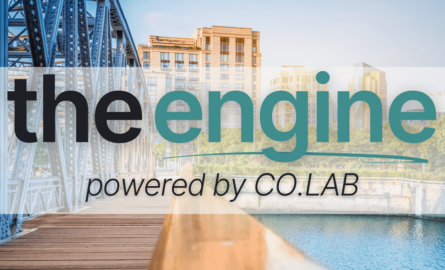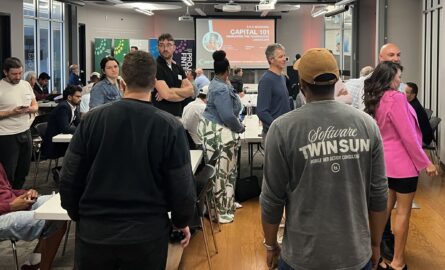For 10 years, the Nashville Entrepreneur Center has been the “front door” to entrepreneurship in our city, making Nashville the best place in the country to start and grow a business.
In the “Power of 10” blog post series, we’re telling the story of the Nashville Entrepreneur Center through the eyes of the entrepreneurs who built it. These 10 interviews will explore the history of the EC, and the impact it’s had on the community, building a strong foundation of entrepreneurship that made Nashville the city it is today. This is the first of 10 posts in this series; check back soon for more!
When Dr. Michael Burcham first became involved with the Nashville Chamber of Commerce initiative that would ultimately lead to the formation of the Entrepreneur Center, he didn’t intend to become the fledgling non-profit’s founding CEO. He started by supporting the cause financially and as a board member, motivated by the fact that he had started three companies but never been able to raise capital in Nashville because the ecosystem wasn’t sufficiently mature. But when asked to lead the EC as its CEO because of his own entrepreneurial experience, he agreed—even though he knew what hard work it would be—because of his passion for the mission.
As part of our celebrations for the 10 year anniversary of the founding of the EC, we’re sharing stories and memories from key people who’ve helped build our organization into what it is today. We kicked things off with a conversation with Michael, the EC’s founding CEO, who served from 2010-2015 and is currently on the board.

The #Powerof10 tells the story of the EC through the eyes of those who built it — from 10 entrepreneurs who were once just starting out to 10 donors who are reaching back to support those coming up behind them.
His stories from the EC’s earliest days will sound familiar to many entrepreneurs who’ve built businesses from the ground up. “It was a serious hustle; in the beginning, we couldn’t afford much at all,” he says. “I was the CEO, but I also took out the trash and made the coffee. Our first furniture was all loaned to us.”
The team wanted a dedicated space to be able to serve entrepreneurs, and made finding a location part of their five-year plan in 2010. That spring, soon after the floods that devastated much of the city, they found a spot on Lower Broadway that had been flooded up to the first floor. “It smelled like mud and fish, so no one wanted to be there,” Michael recalls. “They gave me cheap rent, and we cleaned it out and then opened there.” They opened the space in the summer, and by the end of the year, it was filled to capacity with entrepreneurs, mentors, and staff nearly every day. Though the team had poured blood, sweat, and tears into the Broadway location to get it off the ground, they realized that they’d need a bigger space to realize the EC’s full mission of energizing and empowering Nashville’s entrepreneurial ecosystem.
A cluster of abandoned trolley barns, dilapidated but sitting on a bluff overlooking the city, caught the team’s eye. With the structures listed on the National Register of Historic Places, they would have to be carefully renovated, rather than demolished, in order to be habitable. Through a connection with the Metro Development and Housing Agency, Michael struck a deal: if the EC raised the money to renovate one of the trolley barns, could they use it as their permanent home? The city agreed, and Michael and the team spearheaded an effort to raise nearly $4M for the renovation through a combination of public and private sources.
“The fundraising part is one of the biggest mountains any entrepreneur has to climb,” Michael explains, and it was no different in this case. Even though the EC had already raised a considerable amount in order to launch and move into its first headquarters, the team now needed to meet a new, even bigger goal—much like any entrepreneurial endeavor that must periodically seek funding in order to grow and scale.
The city had several examples of successful public/private funding campaigns to draw from, such as the football stadium downtown. “I knew Nashville embraced that idea,” Michael says. Even so, he and the team realized that they may need to look beyond the city and state levels for support. Researching options at the federal level, they found a grant through the Department of Commerce that was available if they could demonstrate sufficient local support. By rallying a combination of private, city, and state support, the EC showed how much the community cared about the project and secured a $2.5M federal grant. They were able to fully pay for the renovations and move in with no debt, thanks to the fundraising efforts.
Not that the renovations were easy! There may not have been a “fish” smell to contend with, but because the trolley barns were originally used as mechanical garages, the floors were intentionally sloped so that oil and other debris could run off. And because of the buildings’ historical status, everything had to proceed very carefully. “So we had to replace the roof without destroying the trusses, and jackhammer out the floor without destroying the walls,” Michael explains. As for the sloping floor, it gave way to the two-level structure of the EC’s building today, with a set of stairs near the Red Bicycle coffee station.
Aside from finding a physical location for the EC (twice), one of Michael’s biggest projects in his tenure was creating a mentorship program that lives on in the EC’s advisor system today. He was particularly inspired in this work because he says that, as a young entrepreneur himself, he often lacked access to the types of business mentors that would have been helpful.
“For an entrepreneur, mentoring is very specific: you’re helping someone develop a viable business model, and then helping guide how their concept becomes an investable business story, and then how they take that concept and scale it to become a business,” Michael says. “We had successful people in Nashville that had the skills to be a mentor but needed training on how to do it. So we created a training curriculum for how to be a good mentor.” Elements of the training program would later be expanded to cities around the nation, and even be recognized for their value by the White House.
Michael stepped down as CEO in 2015, but continued his involvement in the entrepreneurial community through EO Nashville, Vanderbilt, and Shore Capital. Today, in addition to these other roles, he also serves as a board member for the EC. When asked what he hopes his legacy will be, he says: “When I came to be the CEO at the EC, I knew I wanted to spend the rest of my life helping people who have good concepts have great companies.” Whether in his personal capacity as a mentor or by helping lead larger initiatives like the formation of the EC, Michael has lived out and continues to live out that legacy.
Michael Burcham’s tips for entrepreneurs
-
Be very intentional: Make the decision to do something, and then commit your time and resources to it—even though it isn’t always fun.
-
Have the self-discipline to focus: While others get distracted with play, go the extra mile to do what has to be done in order to realize your vision.
-
Take action: Don’t get stuck just talking and planning forever; eventually, you need to actually do something. Every day before lunch, do one thing that moves you closer to your dream.



